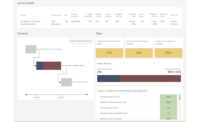Oracle Building AI Assistance Directly Into Its Cloud Services

AI can program drone flights to note conditions such as rusty steel members.
Photo by Jeff yoders/ENR.
Oracle unveiled details about its partnership with artificial intelligence provider Cohere at its Oracle Cloud World conference in Las Vegas Sept. 18. Executives said Cohere will train, build, and deploy large-language models on the Oracle Cloud Infrastructure service. This will let contractors and other users run analyses of their projects without having to call upon their own data scientists, as user data can be directly imported or exported from Oracle’s cloud through the language-based AI. Cohere’s services will also be integrated into Oracle’s portfolio of cloud applications including Fusion and NetSuite.
“The analogy is: Microsoft is to OpenAI and ChatGPT as Oracle is to Cohere,” explained Josh Kanner, senior director of product and strategy for Analytics and AI at Oracle Construction and Engineering. “Oracle invested in Cohere and now has access to their generative AI product, which allows us to build our own industry-tuned private and secure generative AI models, these large-language models.”
OCI/Cohere analysis is already available in beta form, and Oracle’s construction team is working with Cohere on developing construction and engineering solutions for some time-consuming processes. Kanner also said some common AI tasks will be incorporated into Oracle’s construction products such as Primavera Cloud.

Oracle’s Josh Kanner and Greg Pavlik see major potential for large-language AI models.
Photo courtesy Oracle Inc.
“We are starting to work with customers in construction and engineering who want to have [large-language] models built for their own schedules, fine-tuned on their data,” Kanner said. “Cohere is a secure and private generative AI, unlike ChatGPT, which has its roots as a consumer product.”
A contractor’s supply chain and internal bid preparation processes can also be brought into a custom AI language model.
“A scheduler can start a process of building a schedule by kicking off with an AI assistant,” Kanner said. “If you’ve been asked to provide a schedule as a part of a pre-bid package, one of the things that generative AI does nicely is it can read, and then summarize key aspects of a piece of content. This is Cohere’s summarize function.”
The pre-bid scheduler AI tool asks for the details known at the RFP stage of construction, such as a steel structure with slabs supported in place, a metal exterior with curtain wall glazing and other things like building orientation.
“I want to generate a schedule based on what the RFP told me are the beginning and end dates,” explains Burcin Kaplanoglu, vice president, innovation at the Oracle Industry Lab. “You need to review it, you need to revise it, you need to make changes, eventually, but the end date, the beginning date and the details that came from the RFP are reflected.”
Kaplanoglu, a construction executive at Lendlease before joining Oracle, said that pre-bid scheduling is just one of many time-consuming tasks that AI tailored to the construction process can help with. The automation will free up project managers and superintendents for other pursuits or more valuable tasks.
“Typically, you have to pull something together really quickly,” he said. “But in reality, you’re not really going to build off that schedule. When you win the job, you’re going to build your own schedule, with a lot more detail and you’ll know more than what was in the RFP.”
An AI-generated pre-bid schedule can be created in a matter of minutes, Kaplanoglu added. Oracle has also created processes where an AI can generate and automate flight plans for drone data collection.




